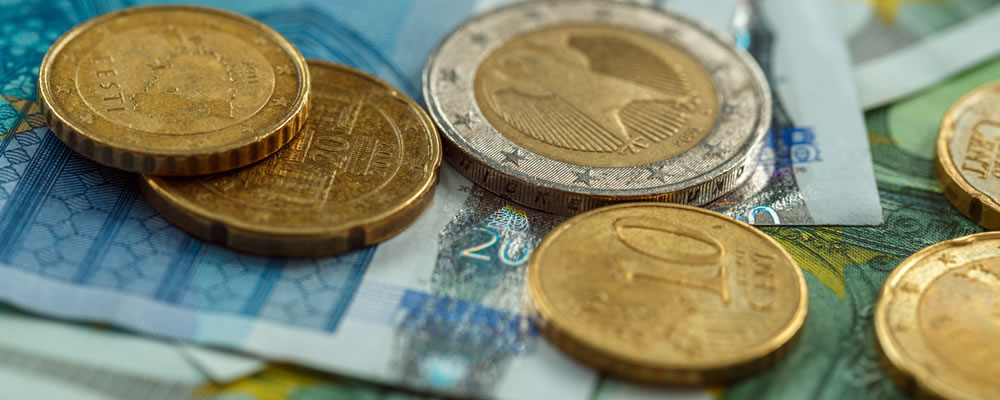- Pound weakened last week by UK data – Repeated drops in confidence seen
- Pre-referendum GDP results discounted – Economists looked ahead to Q3 results
- Euro shifted by contrasting Eurozone stats – Confidence rose post-‘Brexit’
- Possible BoE interest rate cut on Thursday – ECB meeting due Wednesday
UK Construction Result Supports GBP EUR
After dipping on Monday following the publication of less-than-impressive UK manufacturing data, the Pound Euro exchange rate managed to creep higher on Tuesday as the UK’s Construction PMI came in slightly better than feared.
Although the gauge was still markedly below the 50 mark separating growth from contraction, the result of 45.9 beat the estimate of 44.0.
After the report was published the Pound Euro exchange rate advanced to a high of 1.1836.
The pairing went on to rally all the way to 1.1923 on Wednesday as the UK’s Services PMI met initial estimates and wasn’t negatively revised (as was feared might be the case).
The result of 47.4 was hardly upbeat, but the fact it wasn’t worse was taken as a positive sign.
(Previously updated 01/08/2016)
UK Manufacturing PMI Provides Cause for Concern, Pound Euro Exchange Rate Falls
The Pound Euro exchange rate fell by over 0.3% on Monday to hit a low of 1.1773 in response to the UK’s concerning Manufacturing PMI for July.
The manufacturing gauge had been expected to hold at the initial estimate of 49.1 but it was actually negatively revised to 48.2.
Markit economist Rob Dobson said of the report: ‘The final PMI came in at 48.2, down from the earlier flash print of 49.1. The pace of contraction was the fastest since early-2013 amid increasingly widespread reports that business activity has been adversely affected by the EU referendum. The drops in output, new orders and employment were all steeper than flash estimates. “The downturn was felt across industry, with output scaled back across firms of all sizes and across the consumer, intermediate and investment goods sectors, although exporters did report a boost from the weaker Pound.’
The Pound accordingly slumped against the majority of its currency counterparts.
(Previously updated 09:00 01/08/2016)
Pound Sterling (GBP) exchange rates were rattled last week with investors focusing on the upcoming Bank of England (BoE) interest rate decision, with GBP/EUR slipping from a high of 1.21 to trend in the region of 1.18 and GBP/USD fluctuating between 1.30 and 1.35.
The Euro (EUR) fared better than its British peer over the course of the week, rising against the Pound and others on signs of rising confidence in the Eurozone after the historic EU Referendum result.
UK Economic News: Pound’s Strength Eroded against Currency Rivals on Consistently Falling Confidence
The previous week for the Pound was an unenviable one, with losses being widespread and frequent.
Things got off to a bad start on Monday when, in the wake of contracting UK PMI flashes on July 22nd, Bank of England (BoE) official Martin Weale stated that policy adjustments (implying an interest rate cut) were back on the table. This was particularly damaging because Weale had earlier stated that a rate cut was not a guarantee.
The Pound was also dented on Monday by Confederation of British Industry (CBI) data, which showed falling industrial orders in July.
Wednesday brought more disturbing data from the CBI when the Q3 business optimism index fell by a staggering -47%; distributive trades also fell in July from 4 to -14. Although the GDP growth rate for Q2 rose on the year and the quarter, this was voided because it came before the Referendum vote.
Closing off the week was the falling GfK consumer confidence result for July, which had its sharpest drop in 26 years when a decline from -1 to -12 was seen. Adding insult to injury, the decade-long efforts to start construction on Hinkley Point C were upset by a last-minute government stalling on signing the contract.
Euro Exchange Rates Advanced on Broad Range of Eurozone Data Last Week
The previous week for the Euro has been quite separate to that of the Pound, with a number of timely economic announcements raising the Euro’s value at regular intervals.
The week began with the Ifo surveys for Germany in July, which showed falling scores for the business climate and expectations but a slight rise for current conditions.
Wednesday saw the Euro put into an uncertain position, as while the GfK German consumer confidence result for August fell slightly, Italian consumer and business confidence in July rose, despite the pressure currently face by Italy’s banking sector.
Thursday brought a larger-than-expected drop in German unemployment, along with a number of positive Eurozone-wide confidence stats. The only real negative was falling finalised consumer confidence, which was attributed to the UK’s vote for ‘Brexit’. Adding to the optimism, German inflation in July also rose on Thursday afternoon.
Ending the week on a less positive note were mixed Spanish and French GDP results for Q2, as well as stagnant Eurozone unemployment in June and declining Q2 GDP flashes for the single currency bloc.
This Week’s GBP, EUR Forecast: UK PMIs to Open, Historic BoE Rate Cut May Occur
The present week is set to be a crucial one for the Pound’s future value, given how high-impact the scheduled announcements promise to be.
From Monday to Wednesday, there will be a trio of July PMIs, which are forecast to either fall into contraction or remain in that state.
The main event will come on Thursday, where a large number of economists are forecasting that the BoE will cut the UK’s interest rate from 0.50% to 0.25%, which would be the first such decision since 2009. Should this occur, the Pound is set to plummet across the board.
The Eurozone’s spread of data will be thicker, with Monday bringing manufacturing PMIs for July and Wednesday bringing services and composite variants as well as retail sales stats for June.
Also due on Wednesday will be the European Central Bank (ECB) non-monetary policy meeting, which may bring some hints as to how the central bank will act in the future.
Thursday will bring the July retail PMI while Friday will close with Spanish and Italian industrial production figures for the month of June.




